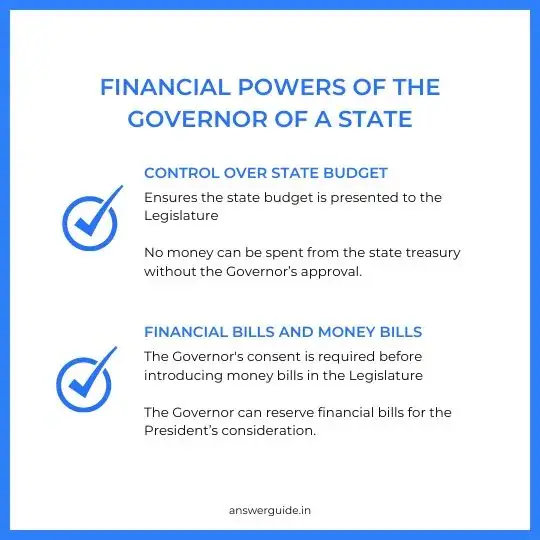The Governor is the constitutional head of a state in India and holds significant executive, legislative, and financial powers. As the representative of the President in the state, the Governor plays a crucial role in the financial administration of the state.
Below are two of the key financial powers vested in the Governor.
Financial Powers of the Governor of a State
Control over State Budget
- Presentation of State Budget : The Governor ensures that the state budget, which outlines the government’s planned revenues and expenditures for the upcoming fiscal year, is presented to the State Legislature. This is a fundamental aspect of the state’s financial management and governance.
- Approval for Expenditure : The Governor’s approval is required for any money to be withdrawn from the state treasury. This means that all government expenditures must have the Governor’s authorization, ensuring accountability and adherence to budgetary provisions.

Financial Bills and Money Bills
- Consent for Introduction : The introduction of any money bill in the State Legislature requires the prior consent of the Governor. Money bills are those that deal with the imposition, abolition, remission, alteration, or regulation of any tax, borrowing of money by the state, expenditure from the state’s consolidated fund, and related financial matters.
- Reservation for Presidential Consideration : The Governor has the authority to reserve certain financial bills passed by the State Legislature for the President of India’s consideration. This power is exercised to ensure that financial legislation is in line with the broader national interests and complies with constitutional provisions. The financial powers of the Governor are crucial for maintaining the financial stability and accountability of the state government.
Conclusion
By controlling the presentation of the state budget and having a say in the introduction and reservation of financial bills, the Governor ensures that the state’s financial management adheres to constitutional mandates and aligns with national interests.
These powers underscore the Governor’s role in upholding the principles of responsible governance and fiscal prudence within the state.



